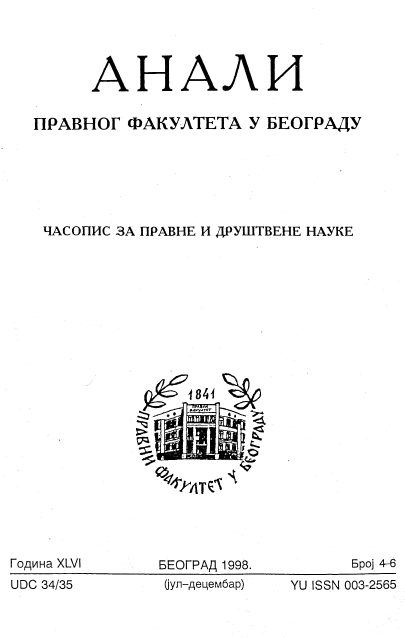КАЗНЕНА НАКНАДА
PUNITIVE DAMAGES
Author(s): Branko A. LubardaSubject(s): Criminal Law
Published by: Правни факултет Универзитета у Београду
Keywords: Loss; Damages; Punitive Damages; Penalty; Legitimacy- Discrimination
Summary/Abstract: Punitive damages, as a kind of private penalty is to be found in several branches of American law, and it also appears as a sanction in the case of discrimination at work. The notion, legal nature and legitimacy of punitive damages presume a specific approach to civil liability, in other words, the concept of civil legal sanctions. The philosophy of reparation (the whole loss but no more) as opposed to private penalty, as the dominant approach in the European legal systems, like in Yugoslav (civil) law, resulted in abandoning private penalty, whose traces mainly survive in clause pénale and court penalties {astreintes'). The evolution of liability for losses led to a kind of triumph for the idea of reparation, both in the case of subjective and with strict liability, including a trend towards the socialisation of liability. Nevertheless, the elements of private penalty persisted to a greater extent than is usually believed, because they are expressed by means of euphemisms that conceal the real nature of the penalty, e.g. pecuniary compensation for non-pecuniary harm, and partly also, in compensation for emotional value {pretium affectionis). The philosophy of reparation also led to the marginalisation of the importance of the degree of fault (subjective liability), which had certain effects on the preservation of moral values. The intrinsic function of reparation, namely, is only the elimination of loss, but not its prevention or deterrence. Whereas, the function of deterrence from causing loss has a powerfully moral effect, and it is immanent to the philosophy of private penalty as a civil sanction. Aside of the philosophy of reparation, there is the philosophy of the explicit complementariness of reparation (compensation of loss) and retribution (private penalty). To the legal values of reparation (primarily the protection of the interests of the damaged party), one attaches the function of deterrence from causing damage that is characteristic of a private penalty, and therefore designated as exemplary compensation. Of course, of itself, this entails retaliation to a certain extent, a moral talion, especially in the form of punitive damages. The philosophy of complementariness leads to a balance between the primary functions of civil sanction, which are restitution or reparation, and the secondary function, which is private penalty (in the form of punitive damages). Nevertheless, in the theory of law, the question remains open as the legitimacy of punitive damages from the viewpoints of equity, ethics and economics. Punitive damages were practically revived in the last two decades of the XX century in different branches of (American) law. Their role became particularly significant in labour law, primarily in regard of the suppression of discrimination at work and in the case of illegal dismissal. Recent solutions in French labour law have contributed to a renaissance of private penalty in the case of a breach of a labour contract. Finally, a kind of private penalty also appears in the Yugoslav law of industrial property, but without the adequate use of terminology and the appropriate concept.
Journal: Анали Правног факултета у Београду
- Issue Year: 46/1998
- Issue No: 4-6
- Page Range: 382-409
- Page Count: 28
- Language: Serbian

